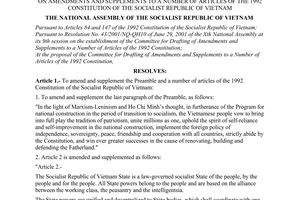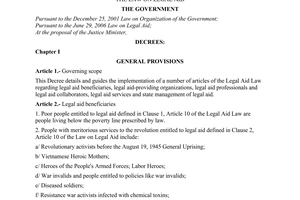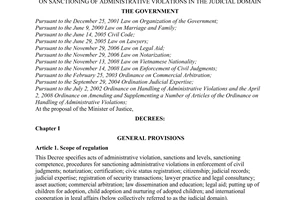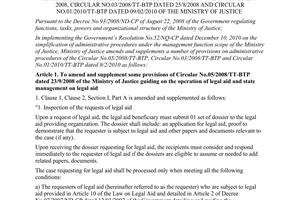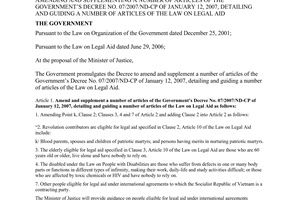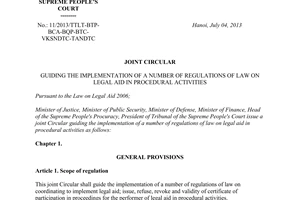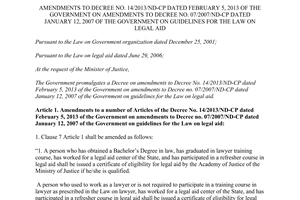Law No. 69/2006/QH11 of June 29, 2006 on legal aid đã được thay thế bởi Law 11/2017/QH14 on legal aid và được áp dụng kể từ ngày 01/01/2018.
Nội dung toàn văn Law No. 69/2006/QH11 of June 29, 2006 on legal aid
|
THE
NATIONAL ASSEMBLY |
OF VIET |
|
No: 69/2006/QH11 |
, June 29, 2006 |
LAW
ON LEGAL AID
Pursuant to the 1992 Constitution of the
of ,
which was amended and supplemented under Resolution No. 51/2001/NQ-QH10 bổ sung điều của Hiến pháp nước cộng hoà xã hội chủ nghĩa Việt Nam năm 1992">51/2001/QH10 of
December 25, 2001, of the Xth National Assembly, the 10th session;
This Law provides for legal aid.
Chapter I
GENERAL PROVISIONS
Article 1.- Governing scope
This Law provides for legal aid beneficiaries, legal aid-providing organizations, legal aid-providing persons, legal aid services and the state management of legal aid.
Article 2.- Subjects of application
This Law applies to agencies, organizations and individuals involved in legal aid services.
When a treaty to which the Socialist Republic of Vietnam is a contracting party contains provisions different from those of this Law, the provisions of that treaty shall apply.
Article 3.- Legal aid
Legal aid means the provision of "pro bono" legal services to legal aid beneficiaries in accordance with this Law to help them protect their legitimate rights and interests and improve their legal understanding as well as their sense of respect for and observance of law; to contribute to law dissemination and education, protect justice, ensure social equity and prevent and restrict disputes and violations of law.
Article 4.- Principles of legal aid services
1. Non-collection of charges, fees or remunerations from legal aid beneficiaries.
2. Honesty and respect for objective truth.
3. Application of appropriate measures in accordance with law in order to best protect legitimate rights and interests of legal aid beneficiaries.
4. Observance of law and professional rules on legal aid.
5. Taking of responsibility before law for legal aid contents.
Article 5.- Legal aid cases
Legal aid cases must be related to legitimate rights and interests of legal aid beneficiaries and must not fall into business or commercial domains.
Article 6.- Legal aid polices
1. It is the State's responsibility to provide legal aid.
2. The State plays a key role in providing, and organizing the provision of, legal aid; encourages and creates conditions for the Vietnam Fatherland Front and its member organizations, law-practicing organizations and lawyers, and other agencies, organizations and individuals to participate in, make contributions to, or support legal aid services.
Article 7.- Responsibilities of organizations and individuals for legal aid services
1. Agencies and organizations shall, within the scope of their tasks and powers, encourage and create conditions for their cadres, civil servants, employees, members and other individuals working in their agencies and organizations to act as legal aid collaborators.
2. Legal proceeding-conducting agencies and other agencies and organizations related to legal aid services shall, within the scope of their tasks and powers, coordinate with, facilitate, and supply information and documents to, legal aid-providing organizations in providing legal aid services.
Article 8.- Legal aid fund
1. The legal aid fund is set up to support the raising of the quality of legal aid services of, and the supply of working equipment and facilities to, legal aid-providing organizations in localities with economic difficulties.
2. Financial sources for the legal aid fund include voluntary contributions and donations of agencies, organizations and individuals, state budget supports and other lawful sources.
3. The legal aid fund operates for non-profit purposes and is entitled to tax exemption. The legal aid fund must be properly managed and used in accordance with law.
4. The Government shall specify the setting up, management and use of the legal aid fund.
Article 9.- Prohibited acts
1. Legal aid-providing organizations and persons may not commit the following acts:
a/ Infringing upon the dignity, honor or legitimate rights and interests of legal aid beneficiaries; discriminating against legal aid beneficiaries;
b/ Receiving or demanding any sum of money or any economic benefit from legal aid beneficiaries; harassing legal aid beneficiaries;
c/ Disclosing information or secrets on legal aid cases or legal aid beneficiaries, unless it is so agreed in writing by legal aid beneficiaries or otherwise provided for by law.
d/ Refusing or discontinuing the provision of legal aid, except for cases specified in Clauses 1 and 2, Article 45 of this Law and provided for by the procedural law;
e/ Abusing legal aid services for self-seeking purposes;
f/ Abusing legal aid services to cause social disorder and unrest, exerting adverse impacts on ethics or national fine customs and traditions, and infringing upon the State's interests or legitimate rights and interests of organizations or individuals;
g/ Inciting legal aid beneficiaries to declare and supply false information and documents or to make complaints or denunciations or initiate lawsuits in contravention of law.
2. Legal aid beneficiaries, agencies, organizations and individuals engaged in legal aid services may not commit the following acts:
a/ Infringing upon the dignity and honor of legal aid-providing persons;
b/ Deliberately supplying false information and documents on legal aid cases;
c/ Obstructing legal aid services; disturbing and causing disorder at legal aid-providing places.
Chapter II
LEGAL AID BENEFICIARIES
Article 10.- Legal aid beneficiaries
1. Poor people;
2. People with meritorious services to the revolution.
3. Lonely elderly people, disabled people and helpless children.
4. Ethnic minority people permanently residing in areas with exceptionally difficult socio-economic conditions.
Article 11.- Rights of legal aid beneficiaries
1. To request legal aid by themselves or via their relatives or representatives.
2. To select legal aid-providing persons; to request the replacement of legal aid-providing persons who fall into one of the cases defined in Clause 2, Article 45 of this Law.
3. To modify or withdraw legal aid requests.
4. To request confidentiality of contents of legal aid cases.
5. To be entitled to damages in accordance with law.
6. To lodge complaints or denunciations about legal aid.
Article 12.- Obligations of legal aid beneficiaries
1. To supply papers proving their eligibility for legal aid.
2. To supply information and documents related to legal aid cases and be accountable for the accuracy of these information and documents.
3. To respect legal aid-providing organizations, legal aid-providing persons and other agencies, organizations and individuals engaged in legal aid services.
4. Not to request a legal aid-providing organization to provide legal aid for the case for which another legal aid-providing organization is providing legal aid.
5. To abide by the law on legal aid and internal rules of places of legal aid provision.
Chapter III
LEGAL AID-PROVIDING ORGANIZATIONS
Article 13.- Legal aid-providing organizations
1. Legal aid-providing organizations include state legal aid centers and legal aid-participating organizations.
2. Legal aid-participating organizations include:
a/ Law-practicing organizations;
b/ Legal counseling organizations of socio-political organizations, socio-political-professional organizations, socio-professional organizations (below collectively referred to as legal counseling organizations).
legal aid centers
1. State legal aid centers are set up under decisions of provincial/municipal People's Committees.
2. State legal aid centers are non-business units attached to provincial/municipal Justice Services, have the legal persons status, their own seals, head offices and accounts. Payrolls and funds for operation of state legal aid centers are decided by provincial/municipal People's Committees.
3. A state legal aid center has a director, a deputy director and legal aid professionals. Directors of state legal aid centers are appointed, removed from office or dismissed by provincial/municipal People's Committee presidents.
Article 15.- Rights and obligations of state legal aid centers
1. To provide legal aid.
2. To request concerned agencies and organizations to coordinate and supply information and documents on legal aid cases.
3. To pay compensations for damage caused by their faults during the process of providing legal aid.
4. To make reports and statistics on legal aid according to regulations.
5. To settle complaints according to the provisions of Clause 1, Article 49 of this Law.
6. To settle disputes over legal aid.
7. To make recommendations on matters related to law enforcement.
Article 16.- Branches of state legal aid centers
1. Based on the demands and practical conditions of localities, presidents of provincial/municipal People's Committees shall decide to establish branches of state legal aid centers at the request of directors of provincial/municipal Justice Services.
2. Branches of state legal aid centers are dependents units of these centers. State legal aid centers are accountable for all operations of their branches. A branch is headed by a legal aid professional who shall be appointed, removed from office or dismissed by the director of the provincial/municipal Justice Service.
Article 17.- Registration for participation in legal aid services by law-practicing organizations and legal counseling organizations
1. Law-practicing organizations and legal counseling organizations that participate in legal aid services shall make written registration of the scope, forms and domains of legal aid with the provincial/municipal Justice Services which have issued their operation registration certificates.
2. The registration for participation in legal aid services is made according to a set form in compliance with the scope, forms and domains of law stated in the operation registration certificate.
Article 18.- Rights and obligations of law-practicing organizations and legal counseling organizations participating in legal aid services
1. To provide legal aid in accordance with their legal aid participation registration certificates.
2. To request concerned agencies and organizations to supply information and documents related to legal aid cases.
3. To compensate for damage caused by their faults during the process of providing legal aid.
4. To make reports and statistics on legal aid according to regulations.
5. To settle disputes over legal aid.
6. To make recommendations on matters related to law enforcement.
Article 19.- Termination of participation in legal aid services by law-practicing organizations and legal counseling organizations
1. Law-practicing organizations or legal counseling organizations terminate their participation in legal aid services in the following cases:
a/ They terminate their participation in legal aid services at their own will;
b/ They are not allowed to further participate in legal aid services in cases of causing serious consequences or committing violations though having been administratively sanctioned according to the provisions of Clause 2, Article 48 of this Law;
c/ They terminate their operation in accordance with law.
2. When terminating their participation in legal aid services, law-practicing organizations or legal counseling organizations shall notify it to the provincial/municipal Justice Services with which they have registered for participation in legal aid services, transfer dossiers of legal aid cases they are handling to state legal aid centers in localities where they have registered for participation in legal aid services, and perform related obligations.
Chapter IV
LEGAL AID-PROVIDING PERSONS
Article 20.- Legal aid-providing persons
1. Legal aid-providing persons include legal aid professionals and legal aid-participating persons.
2. Legal aid-participating persons include:
a/ Collaborators of state legal aid centers (below referred to as collaborators);
b/ Lawyers;
c/ Legal counselors working in legal counseling organizations (below referred to as legal counselors).
3. Those who fall into one of the following cases are prohibited from participating in legal aid services:
a/ Being examined for penal liability or having been convicted but not yet entitled to remission of criminal records or having been convicted for very serious crimes or particularly serious crimes;
b/ Being confined to a medical establishment or reformatory as an administrative handling measure or being put on administrative probation;
c/ Having their civil act capacity lost or restricted;
d/ Having been dismissed from their jobs as a disciplinary form while the three-year time limit counting from the date the dismissal decisions take effect has not yet expired;
e/ Being deprived of the right to use legal practice certificate; or having their legal counselor's certificates withdrawn.
Article 21.- Legal aid professionals
1. Legal aid professionals are Vietnamese citizens who permanently reside in and fully satisfy the following conditions:
a/ Having full civil act capacity; having good moral quality;
b/ Having a law university degree;
c/ Having a certificate of legal aid training;
d/ Having been involved in legal work for two years or more;
e/ Being physically fit for ensuring the fulfillment of assigned tasks.
2. Legal aid professionals are state employees, work in state legal aid centers and are granted legal aid professional's cards by presidents of provincial/municipal People's Committees at the proposal of directors of provincial/municipal Justice Services.
3. Legal aid professionals provide legal aid in the following forms:
a/ Providing legal advice;
b/ Participating in legal proceedings in the capacity as lawful representatives of detainees, the accused or defendants to defend these persons; as defenders of interests of involved parties in criminal cases or as representatives or defenders of legitimate rights and interests of involved parties in civil or administrative cases;
c/ Acting as representatives beyond legal proceedings for legal aid beneficiaries to perform jobs related to law;
d/ Providing legal aid in other forms.
Article 22.- Collaborators
1. Vietnamese citizens who permanently reside in Vietnam, have full civil act capacity, have good moral quality, are physically fit for ensuring the fulfillment of assigned tasks, voluntarily participate in legal aid services and do not fall into one of the cases specified in Clause 3, Article 20 of this Law will be considered, recognized and granted collaborator's cards by directors of provincial/municipal Justice Services if:
a/ They have a law university degree; they have a university degree in another major and work in branches or professions related to fundamental rights and obligations of citizens;
b/ They permanently reside in areas with exceptional socio-economic difficulties, ethnic minority or mountainous regions, have an intermediate degree in law or have been involved in legal work for three years or more, or have legal knowledge and high prestige in their communities;
c/ They are lawyers or legal counselors.
2. Collaborators shall participate in legal aid services under the assignment of directors of state legal aid centers.
Collaborators who are not lawyers shall participate in legal aid services only in the form of legal counseling.
3. When participating in legal aid services, collaborators are entitled to remuneration and administrative expenses in accordance with law.
Article 23.- Lawyers participating in legal aid services
Lawyers shall participate in legal aid services in accordance with the law on lawyers and in the capacity as collaborators of state legal aid centers in accordance with this Law.
Article 24.- Legal counselors participating in legal aid services
Legal counselors shall participate in legal aid services under the assignment of legal counseling organizations where they are working and in the capacity as collaborators of state legal aid centers.
Article 25.- Rights and obligations of legal aid-providing persons
1. To provide legal aid.
2. To refuse or discontinue the provision of legal aid in cases specified in Clauses 1 and 2, Article 45 of this Law and in accordance with procedural law.
3. To be trained in legal aid knowledge and skills.
4. To abide by the principles of legal aid services.
5. To observe internal rules of legal aid-providing organizations.
6. To promptly report to legal aid-providing organizations on arising matters which may affect legal aid results.
Chapter V
SCOPE, FORMS AND ACTIVITIES OF LEGAL AID
Section 1. SCOPE AND FORMS OF LEGAL AID
Article 26.- Scope of legal aid
1. State legal aid centers in provinces and centrally run cities shall provide legal aid within the following scope:
a/ Legal aid beneficiaries residing in their localities;
b/ Legal aid cases occurring in their localities;
c/ Legal aid cases transferred by other legal aid-providing organizations.
2. Law-practicing organizations and legal counseling organizations shall participate in legal aid services within their registered scope.
Article 27.- Forms of legal aid
1. Legal counseling.
2. Participation in legal proceedings.
3. Representation beyond legal proceedings.
4. Other forms of legal aid.
Article 28.- Legal counseling
Legal aid professionals, collaborators, lawyers and legal counselors shall provide legal counseling to legal aid beneficiaries by giving instructions, explanations and opinions, supplying legal information or drafting documents related to legal aid cases.
Article 29.- Participation in legal proceedings
1. Legal aid professionals and lawyers shall participate in criminal proceedings to defend legal aid beneficiaries who are detainees, the accused or defendants or to protect interests of legal aid beneficiaries who are victims, civil plaintiffs, civil defendants or persons with rights and interests related to criminal cases.
2. Legal aid professionals and lawyers shall participate in civil proceedings and administrative proceedings to protect legitimate rights and interests of legal aid beneficiaries in civil and administrative cases.
Article 30.- Representation beyond legal proceedings
1. Legal aid professionals and lawyers shall act as representatives beyond legal proceedings for legal aid beneficiaries who cannot protect their legitimate rights and interests by themselves.
2. Representation beyond legal proceedings shall be carried out within the scope of the request of a legal aid beneficiary.
Article 31.- Other forms of legal aid
Legal aid professionals and lawyers shall provide legal aid in other forms to legal aid beneficiaries by helping them make reconciliation or performing other tasks related to administrative procedures, complaints and other activities in accordance with law.
Section 2. LEGAL AID SERVICES
Article 32.- Places for reception of legal aid beneficiaries
1. Legal aid-providing organizations shall arrange places for reception of legal aid beneficiaries which are convenient for legal aid beneficiaries to express their requests.
2. At the reception places, the timetable for and internal rules on reception of legal aid beneficiaries must be posted up.
Article 33.- Legal aid requests
Legal aid beneficiaries shall file written requests or directly meet legal aid-providing persons to explain their cases and produce papers proving their eligibility for legal aid. If a legal aid beneficiary cannot write a request by himself/herself, the legal aid-providing person shall fill in the request form, give it to the legal aid beneficiary for reading or read it to the legal aid beneficiary and asks him/her to sign or press his/her fingerprint on the filled-in form.
Article 34.- Acceptance of legal aid cases
1. Those who receive written requests for legal aid shall check their contents related to legal aid and shall accept those requests that involve cases, within the scope and with beneficiaries as defined in Articles 5, 10 and 26 of this Law.
2. When legal aid beneficiaries lack papers proving their eligibility for legal aid or papers and documents related to the legal aid cases, the persons who receive the requests of the legal aid beneficiaries shall guide them to supply these papers and documents.
Article 35.- Provision of legal aid
When providing legal aid, legal aid-providing persons shall thoroughly study papers and documents in the dossiers of the cases related to the legal aid requests, details of the cases and relevant legal provisions, and apply appropriate measures in conformity with law to provide legal aid.
Article 36.- Coordination in verifying legal aid cases
1. When it is necessary to verify details and facts related to a legal aid case in another locality, the state legal aid center which has accepted the case may request the state legal aid center in that locality to join in the verification. A verification request must be made in writing, clearly stating the to be-verified contents and the deadline for reply.
2. The requested state legal aid center shall carry out the verification and send a notice of the verification results, together with relevant papers and documents, to the requesting state legal aid center.
3. The verification requests, notices of verification results and relevant papers and documents must be filed in dossiers of legal aid cases.
Article 37.- Transfer of legal aid cases
1. State legal aid centers may send documents on the transfer of legal aid cases, together with relevant dossiers, to state legal aid centers in other localities for the provision of legal aid according to the provisions of Clause 1, Article 26 of this Law and notify concerned legal aid beneficiaries thereof.
2. After receiving documents on the transfer of legal aid cases and relevant dossiers, state legal aid centers shall accept the cases and notify concerned legal aid beneficiaries thereof.
Article 38.- Legal counseling activities
1. Legal counseling shall be provided verbally or in writing; directly, by mail, telegraphs or through other means of communication; through itinerant legal aid services, law-specialized activities, legal aid clubs or in other forms.
2. For simple cases, legal aid-providing persons shall immediately provide legal advice and record the major contents on the legal aid-provision slips. A legal aid-provision slip shall be made in two copies, one copy to be given to the legal aid beneficiary and the other copy to be filed in the dossier of the case.
3. For complicated cases which require time for study or verification or cases which lack relevant papers and documents, legal aid-providing persons shall make appointment slips or request the submission of relevant papers and documents.
Within 15 days after accepting the cases or receiving adequate papers and documents, legal aid-providing persons shall study the cases and issue written replies to legal aid beneficiaries; for cases which require time for verification, this time limit may be longer but must not exceed 30 days.
4. For counseling requests sent by mail, legal aid-providing persons shall issue written replies within 15 days after receiving the requests.
Article 39.- Participation in legal proceedings
1. Within three working days after receiving legal aid beneficiaries' requests for the appointment of persons to participate in legal proceedings as provided for in Article 29 of this Law, state legal aid centers or law-practicing organizations shall appoint legal aid-providing persons to participate in legal proceedings.
The appointment of persons to participate in legal proceedings must be expressed in a document to be sent to concerned legal aid beneficiaries and legal proceeding-conducting agencies.
2. Legal proceeding-conducting agencies shall issue defense counsel's certificates, certificates of defenders of interests of involved parties in criminal cases or certificates of the defenders of legitimate rights and interests of involved parties in civil or administrative cases (collectively referred to as proceeding participation certificates) to legal aid professionals and lawyers within three days after receiving state legal aid centers' documents on the appointment of persons to participate in legal proceedings, unless otherwise provided for by the procedural law.
The grant of proceeding participation certificates to lawyers who participate in legal aid services under the appointment of law-practicing organizations or to lawyers who practice law individually shall comply with the procedural law and the law on lawyers.
3. Except when they are withdrawn or when legal aid professionals and lawyers are replaced or not allowed to participate in legal proceedings as provided for by law, proceeding participation certificates granted to legal aid professionals and lawyers are valid in all stages of legal proceedings.
4. When participating in legal proceedings, legal aid professionals and lawyers shall produce their proceeding participation certificates, legal aid professional's cards or lawyer's cards; have rights and obligations as provided for by the procedural law; and may apply measures provided for by the procedural law to protect legitimate rights and interests of legal aid beneficiaries.
Article 40.- Representation beyond legal proceedings
1. Within three working days after receiving legal aid requests, state legal aid centers or law-practicing organizations shall appoint legal aid-providing persons to act as representatives beyond legal proceedings for legal aid beneficiaries.
The appointment of representatives beyond legal proceedings must be expressed in a document to be sent to concerned legal aid beneficiaries.
2. When performing representation beyond legal proceedings, representatives shall apply appropriate measures in accordance with law to protect legitimate rights and interests of legal aid beneficiaries.
Article 41.- Other legal aid services
1. When requested by legal aid beneficiaries, state legal aid centers or law-practicing organizations shall appoint persons to provide them with other legal aid services in accordance with Article 31 of this Law.
2. The provision of other legal aid services must be recorded in a minutes.
Article 42.- Recommendations made through legal aid services
Through legal aid services, legal aid-providing organizations may make written recommendations to competent state agencies on matters related to law enforcement. Agencies that receive those recommendations shall, within the scope of their tasks and powers, consider and settle them in accordance with law.
Article 43.- Dossiers of legal aid cases
1. When providing legal aid, legal aid-providing persons shall compile dossiers of legal aid cases. The dossier of a legal aid case comprises:
a/ A written request for legal aid;
b/ Papers proving the requester's eligibility for legal aid;
c/ Papers and documents related to the legal aid case.
2. For cases of legal aid provided in the form of legal counseling, apart from papers and documents specified in Clause 1 of this Article, their dossiers also comprise legal aid-provision slips or documents on legal counseling.
3. For cases of legal aid provided in the form of participation in legal proceedings, apart from papers and documents specified in Clause 1 of this Article, the dossiers also comprise the following papers:
a/ The document on the appointment of a legal aid professional or lawyer;
b/ The document on the defense or protection of interests of the legal aid beneficiary.
4. For cases of legal aid provided in the form of representation beyond legal proceedings, apart from papers and documents specified in Clause 1 of this Article, the dossiers also comprise reports on the jobs that have been done by legal aid-providing persons within the scope of representation beyond legal proceedings.
5. For cases of legal aid provided in other forms, apart from papers and documents specified in Clause 1 of this Article, the dossiers also comprise the minutes on the provision of legal aid.
Article 44.- Filing of legal aid case dossiers
1. Within 15 days after finishing the legal aid cases, legal aid-providing persons shall transfer their dossiers to their legal aid-providing organizations.
2. Dossiers of legal aid cases shall be classified, numbered and arranged chronologically according to the forms and legal domains in which legal aid is provided and preserved for five years after the date of transfer.
Article 45.- Refusal or discontinuation of the provision of legal aid
1. A legal aid case will be rejected or discontinued if it falls into one of the following circumstances:
a/ The legal aid requester is not eligible according to Article 10 of this Law;
b/ The legal aid beneficiary intentionally supplies false information and documents on the case;
c/ The legal aid beneficiary seriously violates internal rules or causes disorder at the place of legal aid provision; infringes upon the honor or dignity of the legal aid-providing person;
d/ The legal aid beneficiary withdraws his/her request for legal aid;
e/ The legal aid case is currently dealt with by another legal aid-providing organization;
f/ The legal aid case does not comply with the provisions of Article 5 and Article 26 of this Law;
g/ The legal aid case should be transferred under Article 37 of this Law.
2. The legal aid-providing person shall refuse or discontinue the provision of legal aid in the following cases:
a/ He/she has provided or is providing legal aid to a legal aid beneficiary that is a party with conflicting interests in the same case, except for cases of reconciliation or legal counseling;
b/ His/her legitimate rights and interests are related to or his/her relatives are involved in the legal aid case;
c/ He/she previously settled the case;
d/ There are grounds to believe that he/she is possibly biased during the process of providing legal aid.
3. When the legal aid-providing person must refuse or discontinue the provision of legal aid under Clause 2 of this Article, his/her legal aid-providing organization shall appoint another person to provide legal aid or he/she shall introduce another legal aid-providing person to the concerned legal aid beneficiary.
4. When refusing or discontinuing the provision of legal aid, the legal aid-providing organization or legal aid-providing person shall notify the reason therefor in writing to the concerned legal aid beneficiary.
Chapter VI
STATE MANAGEMENT OF LEGAL AID
Article 46.- Contents of state management of legal aid
1. Elaborating, promulgating, guiding, and organizing the implementation of, legal documents on legal aid; formulating strategies and plans on the development of legal aid.
2. Promulgating, and organizing the implementation of, professional regulations, criteria, regimes, policies and professional rules on legal aid.
3. Managing and guiding the organization and operation of state legal aid centers and their branches; issuing, withdrawing or renewing certificates of registration for participation in legal aid services of law-practicing organizations and legal counseling organizations; and adopting measures to support the development of legal aid services.
4. Managing and training the contingent of legal aid-providing persons; granting and withdrawing legal aid professional's cards; recognizing, granting and withdrawing collaborator's cards; issuing the form of registration for participation in legal aid, forms of legal aid professional's cards and collaborator's cards; and publishing documents on legal aid.
5. Making reports and statistics on legal aid according to regulations.
6. Ensuring funds, working equipment and other physical conditions for the provision of legal aid services by the State; and setting up and managing the legal aid fund.
7. Examining, inspecting, settling complaints and denunciations, effecting commendation, reward and disciplining, and handling violations in the domain of legal aid.
8. Implementing international cooperation in the domain of legal aid.
Article 47.- Agencies performing state management of legal aid
1. The Government shall perform the uniform state management of legal aid.
2. The Ministry of Justice shall take responsibility before the Government for the performance of state management of legal aid.
3. Ministries and ministerial-level agencies shall, within the scope of their tasks and powers, coordinate with the Ministry of Justice in performing the state management of legal aid.
4. Provincial/municipal People's Committees shall, within the scope of their tasks and powers, perform the state management of legal aid in their localities; ensure payroll, funds, material bases and working equipment and facilities for state legal aid centers; conduct inspection and examination, settle complaints and denunciations, effect commendation, reward and disciplining, and handle violations in the domain of legal aid in their localities.
Chapter VII
HANDLING OF VIOLATIONS AND SETTLEMENT OF COMPLAINTS, DENUNCIATIONS AND DISPUTES
Article 48.- Handling of violations
1. Legal aid-providing persons, legal aid beneficiaries and other persons who commit acts of violating the provisions of this Law shall, depending on the nature and seriousness of their violations, be disciplined, administratively sanctioned or examined for penal liability; if causing damage, they shall pay compensation therefor in accordance with law.
2. Legal aid-participating organizations that commit acts of violating the provisions of this Law shall be administratively sanctioned; if causing damage, they shall pay compensation therefor in accordance with law; if causing serious consequences or committing violations though having been administratively sanctioned, they shall be banned from participation in legal aid services.
3. Those who abuse their position or powers to hinder or cause difficulties to legal aid services or commit acts of violating the law on legal aid shall, depending on the nature and seriousness of their violations, be disciplined or examined for penal liability; if causing damage, they shall pay compensation therefor in accordance with law.
4. Forms, competence and procedures for handling administrative violations on legal aid shall comply with the law on handling of administrative violations.
Article 49.- Settlement of complaints and denunciations
1. Legal aid beneficiaries may lodge complaints about the following acts of state legal aid centers, legal aid professionals or collaborators when having grounds to believe that those acts are unlawful acts or infringe upon their legitimate rights and interests:
a/ Refusing to accept legal aid cases;
b/ Failing to provide legal aid;
c/ Changing legal aid-providing persons.
Directors of state legal aid centers shall settle complaints about acts defined in this Clause within three working days after receiving the complaints; the complainants who disagree with complaint-settlement decisions of directors of state legal aid centers may further lodge their complaints to directors of provincial/municipal Justice Services. Directors of provincial/municipal Justice Services shall settle complaints within 15 days after receiving them.
2. Organizations and individuals may complain about the issuance, renewal and withdrawal of certificates of registration for the provision of legal aid; the grant and withdrawal of collaborator's cards; and disciplining decisions, decisions on administrative sanctions and other administrative decisions and acts in the domain of legal aid.
The settlement of complaints about legal aid specified in this Clause shall comply with the law or complaints.
3. Individuals may denounce violations of this Law to competent state agencies. Denunciations and settlement of denunciations shall comply with the law on denunciations.
Article 50.- Settlement of disputes
1. Disputes arising between legal aid beneficiaries and legal aid professionals, collaborators, state legal aid centers, legal counselors or legal counseling organizations regarding the provision of legal aid shall be settled in accordance with the civil law.
2. Disputes arising between legal aid beneficiaries and lawyers or law-practicing organizations regarding the provision of legal aid shall be settled in accordance with the law on lawyers and other relevant laws.
Chapter VIII
IMPLEMENTATION PROVISIONS
Article 51.- Implementation effect
This Law takes effect on January 1, 2007.
Article 52.- Implementation guidance
The Government, the Supreme People's Court and the Supreme People's Procuracy shall, within the scope of their functions and tasks, detail and guide the implementation of this Law.

